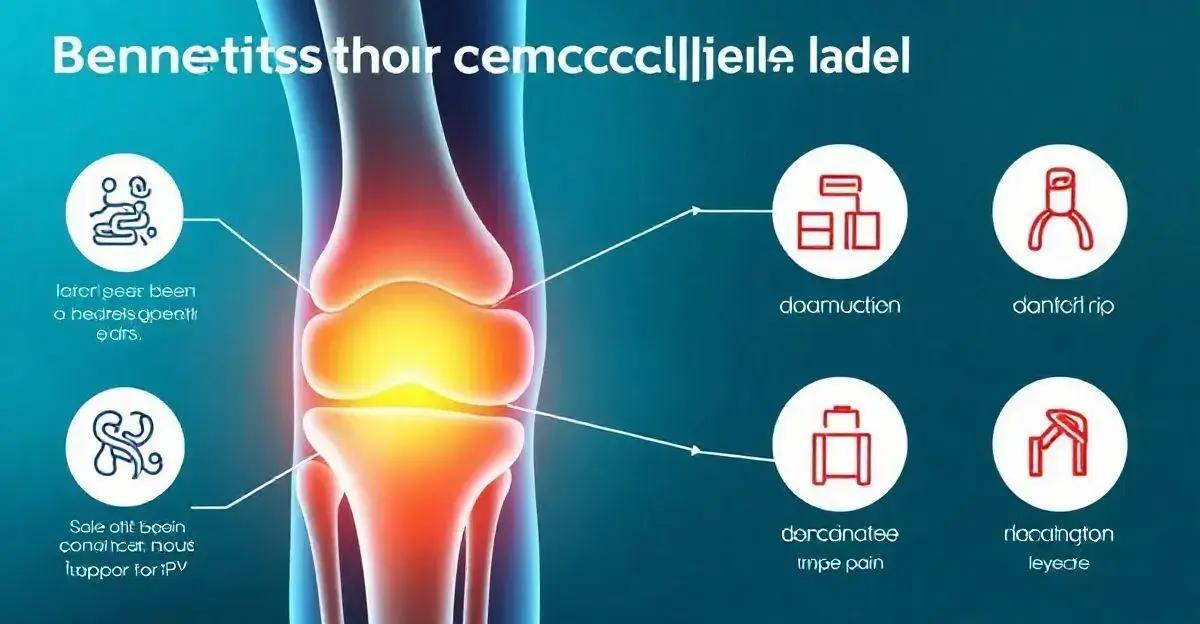Collagen is essential for joint health as it supports cartilage integrity, alleviates pain, and improves flexibility. Many individuals report significant enhancements in joint function and comfort after adding collagen to their diets through supplements, bone broth, or collagen-rich foods. Regularly incorporating collagen can lead to better overall well-being and an active lifestyle, making it a proactive choice for healthier joints.
If you’re struggling with joint pain or stiffness, you may be wondering how collagen can help. This essential protein plays a vital role in maintaining healthy joints and can significantly improve your overall joint function. In this article, we’ll explore the key benefits of collagen for joint health and how it can help you feel better.
What is Collagen and Its Importance for Joints?
Collagen is the most abundant protein in the human body, making up about 30% of total protein content. It serves as a key structural component found in various tissues, including skin, bones, muscles, and, importantly, joints.
In the context of joint health, collagen is primarily found in cartilage, tendons, and ligaments, where it provides essential support and elasticity.
As we age, our body’s natural collagen production decreases, which can lead to joint-related issues such as pain, stiffness, and decreased mobility. This decline in collagen can also result in the deterioration of cartilage, causing bones to rub against each other and leading to conditions like osteoarthritis.
Understanding the importance of collagen for joint health is crucial for several reasons:
- Maintaining Cartilage Integrity: Collagen is a major component of cartilage, the protective tissue that cushions joints. Healthy cartilage is vital for smooth movement and overall joint function.
- Supporting Joint Structure: Collagen provides the structural framework for joints, helping to keep them stable and functional. It acts as a scaffold that supports the various components of the joint.
- Reducing Inflammation: Collagen possesses anti-inflammatory properties that can help alleviate inflammation in the joints, which is often a cause of pain and discomfort.
- Promoting Recovery: Collagen aids in the repair and regeneration of damaged tissues, which is essential for recovery from injuries or overuse.
By incorporating collagen into your diet through supplements or collagen-rich foods, you can help maintain healthy joints and potentially prevent the onset of joint-related issues as you age.

How Collagen Supports Cartilage Health
Collagen plays a critical role in supporting cartilage health, which is essential for maintaining proper joint function. Here’s how collagen contributes to the health and integrity of cartilage:
1. Major Component of Cartilage: Collagen is the primary protein found in cartilage, providing it with structure and strength. The most abundant type of collagen in cartilage is Type II collagen, which is crucial for the elasticity and resilience of this tissue.
2. Maintains Cartilage Integrity: Healthy collagen levels help maintain the integrity of cartilage, ensuring that it can effectively cushion joints. This cushioning is vital for preventing wear and tear that can lead to joint pain and degeneration.
3. Aids in Cartilage Repair: Collagen supports the repair and regeneration of damaged cartilage. When joints are injured or experience wear due to aging or overuse, collagen helps to rebuild and restore the cartilage, promoting healing and reducing pain.
4. Reduces Inflammation: Collagen has anti-inflammatory properties that can help alleviate inflammation in the cartilage, which is often implicated in joint pain and stiffness. By reducing inflammation, collagen can enhance joint comfort and function.
5. Supports Joint Lubrication: Collagen contributes to the production of synovial fluid, which lubricates joints and further protects cartilage from friction during movement. This lubrication is essential for smooth joint function and helps prevent damage to cartilage.
Incorporating collagen into your diet, whether through supplements or collagen-rich foods, can significantly benefit cartilage health, leading to improved joint function and overall mobility.
The Role of Collagen in Reducing Joint Pain
Collagen plays a significant role in reducing joint pain, making it an essential component for those suffering from discomfort and stiffness. Here’s how collagen helps alleviate joint pain:
1. Supports Cartilage Repair: Collagen is crucial for the regeneration of cartilage, the tissue that cushions joints. By replenishing collagen levels, you can enhance the repair process of damaged cartilage, which helps reduce pain during movement.
2. Reduces Inflammation: Chronic inflammation is a common cause of joint pain. Collagen has anti-inflammatory properties that can help decrease inflammation in the joints, leading to reduced discomfort and improved overall joint health.
3. Enhances Joint Lubrication: Collagen contributes to the production of synovial fluid, which lubricates the joints. Improved lubrication helps reduce friction between bones, making movements smoother and less painful.
4. Improves Joint Flexibility: By supporting the structure and elasticity of joint tissues, collagen aids in maintaining joint flexibility. Increased flexibility can help alleviate tightness and reduce the likelihood of experiencing pain during physical activities.
5. Promotes Recovery from Injury: Collagen plays a vital role in tissue repair. After an injury or overuse, collagen helps in the recovery process, allowing damaged joint tissues to heal faster and reducing the duration and severity of pain.
Incorporating collagen into your diet through supplements or collagen-rich foods can significantly help in reducing joint pain, allowing you to enjoy a more active lifestyle without discomfort.

Collagen and Joint Flexibility: What You Need to Know
Collagen is essential for maintaining joint flexibility, a critical aspect of overall joint health. Understanding the relationship between collagen and joint flexibility can help you make informed decisions about your diet and lifestyle. Here’s what you need to know:
1. Provides Structural Support: Collagen acts as a primary structural component in joint tissues, including cartilage, ligaments, and tendons. This structural support is vital for maintaining the integrity and flexibility of the joints, allowing them to withstand the stresses of movement.
2. Enhances Elasticity: Collagen has a unique ability to stretch and return to its original shape, providing elasticity to joint tissues. This elasticity is crucial for allowing joints to move freely without stiffness or discomfort, particularly during physical activities.
3. Reduces Stiffness: Adequate collagen levels can help reduce stiffness in the joints, especially after periods of inactivity or exercise. This reduction in stiffness is essential for maintaining a full range of motion and preventing injuries.
4. Supports Recovery and Repair: Collagen promotes the healing of damaged joint tissues, aiding in recovery after injuries or overuse. By facilitating tissue repair, collagen helps restore flexibility and function to the joints.
5. Encourages Joint Mobility: Increased collagen intake can lead to improved joint mobility, allowing for better performance in physical activities and daily tasks. Enhanced mobility can also contribute to a more active lifestyle and improved quality of life.
To support joint flexibility, consider incorporating collagen into your diet through supplements or collagen-rich foods. By doing so, you can help maintain healthy joints and enjoy greater freedom of movement.
How to Incorporate Collagen into Your Diet for Joint Health
Incorporating collagen into your diet is straightforward and can significantly benefit your joint health. Here are some effective strategies to boost your collagen intake:
1. Use Collagen Powder: One of the easiest ways to add collagen to your diet is by using collagen powder. You can mix it into smoothies, coffee, tea, or even yogurt. It blends well and doesn’t alter the taste of your favorite beverages.
2. Consume Bone Broth: Bone broth is an excellent source of collagen. Use it as a base for soups, stews, or sauces. Sipping on warm bone broth is not only nourishing but also a delicious way to increase your collagen intake.
3. Include Collagen-Rich Foods: Incorporate foods that are naturally high in collagen into your meals. These include chicken skin, fish (especially with skin), and egg dishes. Roasting chicken with the skin on or enjoying salmon with its skin can provide substantial collagen benefits.
4. Snack on Collagen-Infused Products: Many brands offer collagen-infused snacks, such as protein bars, gummies, or chips. These are convenient options for on-the-go collagen consumption and can easily fit into your daily routine.
5. Bake with Collagen: Add collagen powder to your baking recipes. You can replace a portion of the flour in muffins, pancakes, and cookies with collagen powder to create nutritious treats while boosting your collagen intake.
6. Explore Collagen Recipes: Look for recipes specifically designed to include collagen. From smoothies and energy balls to desserts like collagen-infused chocolate mousse, there are numerous ways to creatively enjoy collagen in your diet.
By adopting these strategies, you can easily incorporate collagen into your daily routine, supporting your joint health and overall well-being.

Real-Life Success Stories: Collagen and Joint Health
Real-life success stories can provide powerful insights into how collagen can positively impact joint health. Here are some inspiring accounts from individuals who have experienced significant improvements:
1. John’s Journey: John, a 55-year-old avid golfer, struggled with knee pain for years. After incorporating collagen peptides into his daily routine, he noticed a remarkable reduction in pain and stiffness. John now enjoys playing golf without discomfort, attributing his success to the collagen he added to his diet.
2. Emily’s Transformation: Emily, a 42-year-old fitness enthusiast, began experiencing joint stiffness after intense workouts. Skeptical but hopeful, she started taking collagen supplements. Within weeks, Emily reported less stiffness and improved flexibility, allowing her to return to her regular workout routine with ease.
3. Mark’s Recovery: Mark, a 62-year-old retiree, faced chronic joint pain due to osteoarthritis. After incorporating bone broth into his diet, he experienced a significant decrease in pain levels. Mark now enjoys daily walks and gardening, activities he thought he’d have to give up.
4. Sarah’s Experience: Sarah, a 35-year-old yoga instructor, noticed that collagen helped her recover from injuries sustained during practices. After adding collagen-rich foods to her diet, she found her joints felt more flexible and less painful, enhancing her overall performance in yoga.
5. Tom’s Testimonial: Tom, a construction worker in his late 40s, often dealt with joint discomfort from heavy lifting. After starting a regimen of collagen supplements, he reported improved joint health and recovery times. Tom now feels more energetic and capable of handling the physical demands of his job.
These success stories highlight the potential benefits of collagen for joint health. Whether you’re dealing with chronic pain or simply looking to support your joints, these individuals’ experiences demonstrate the positive impact collagen can have on maintaining joint function and comfort.
Conclusion
In conclusion, collagen is a vital protein that plays a crucial role in maintaining joint health and function.
Its ability to support cartilage integrity, reduce joint pain, and enhance flexibility makes it an essential component for anyone looking to improve their joint wellness.
Real-life success stories illustrate the transformative effects of collagen supplementation, encouraging others to explore its benefits.
Incorporating collagen into your diet through supplements, bone broth, and collagen-rich foods can lead to significant improvements in your overall joint health.
As you consider your options for managing joint discomfort and promoting mobility, remember that consistency is key.
By making collagen a regular part of your routine, you can enjoy a more active lifestyle and better quality of life.
Take the first step toward healthier joints today by exploring the various ways to integrate collagen into your diet and experience the multitude of benefits it has to offer!
FAQ – Frequently Asked Questions about Collagen and Joint Health
How does collagen help with joint health?
Collagen helps maintain the structure of cartilage, reduces inflammation, supports joint lubrication, and aids in the repair of damaged tissues.
What types of collagen are best for joint health?
Type II collagen is particularly effective for joint health as it is primarily found in cartilage. Type I and Type III collagen also contribute to overall joint support.
How long does it take to see results from collagen supplements?
Many individuals report noticeable improvements in joint pain and flexibility within 4 to 8 weeks of consistent collagen supplementation.
Can I get enough collagen from my diet alone?
Yes, you can obtain collagen from foods such as bone broth, chicken skin, fish with skin, and egg dishes, but supplements can provide a more concentrated source.
Are there any side effects of taking collagen supplements?
Collagen supplements are generally safe for most people. Some may experience mild digestive discomfort, but serious side effects are rare.
Can collagen help with other joint issues besides pain?
Yes, collagen can also help improve joint flexibility, support recovery from injuries, and reduce stiffness in the joints.


